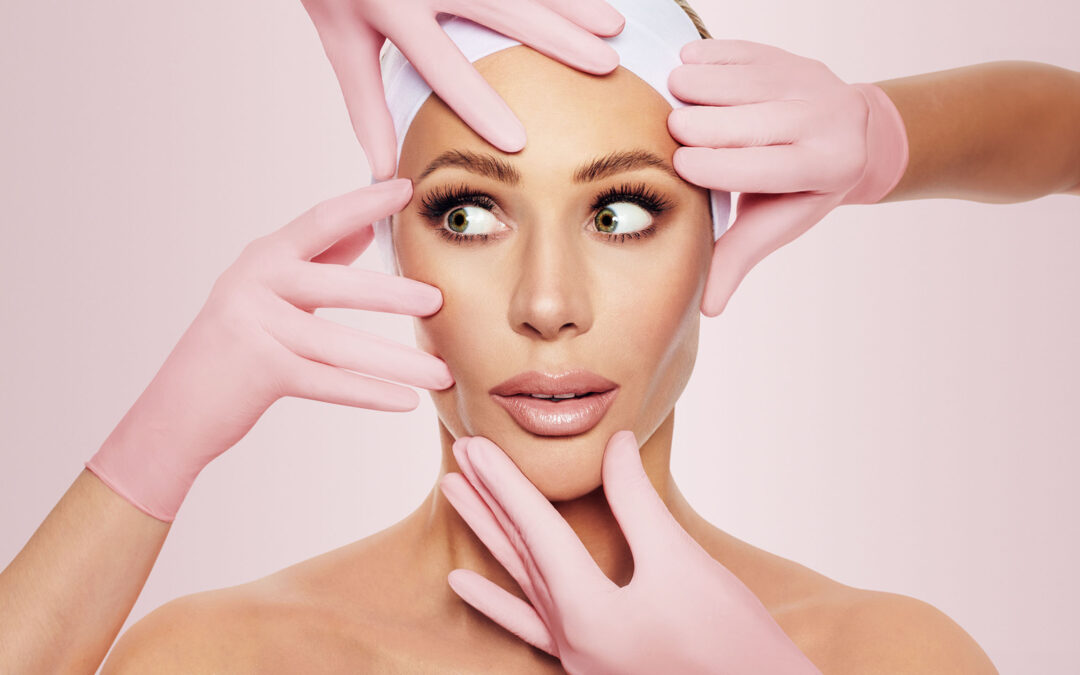Should celebs be honest about their tweakments? Olivia Attwood weighs in
The host of ITV’s The Price of Perfection says our idols don’t owe us an explanation, but if they’re going to comment then they owe us the truth.
Words by Nikki Peach

Barely a day goes by without a female celebrity being ‘accused’ of having cosmetic surgery done, lambasted for admitting it, or advised how to improve their appearance by strangers on the internet.
The recent flurry of speculation surrounding Kris Jenner’s alleged, age-defying face and neck lift, Anne Hathaway’s ‘fresh face’ and Lindsay Lohan’s ‘remarkable transformation’, prove the discourse feeds itself. While a lot of media savvy stars know when to turn a blind eye to invasive criticism, some choose the opposite approach.
Lohan, for example, recently rebutted face lift rumours and credited her flawless complexion to ‘juice and chia seeds’. Jenner might not have responded to the latest rumours of a ‘£100k face lift’, but she went under the knife on camera in 2011 on Keeping Up With The Kardashians. Her daughter Kylie launched a billion-dollar beauty empire off the back of rumours she had lip filler in 2015, after originally attributing her larger lips to ‘pouting’ and ‘over-lining’. She later admitted to having filler. In 2023, Amy Schumer called out stars using weight-loss jabs and claiming they had simply been eating ‘smaller portions’, telling them to ‘be real with the people’.
For presenter and podcaster Olivia Attwood, 34, discussion about her appearance has been rife the entirely of her time in the public eye, since appearing on Love Island in 2016. Attwood has always chosen to be honest about any cosmetic treatments she’s had – from chin shaping JawTite surgery to salmon sperm facials – but believes that it is a ‘lose lose’ situation for women. ‘You see the derogatory comments online: “Oh my god, doesn’t she look old?”, “She goes crows feet!”, “She’s put on weight”. Then said person might go and get a face lift or whatever and then the comments go: “Oh my god, she looks like a freak.” You actually cannot win.’
‘The problem women have, and I’ve found this myself,’ she continues, ‘is a lot of women in the public eye don’t want to disclose when they’ve had work done because it’s really hard to move the conversation on. Once you’ve talked about it, you could go and do an interview about a dog rescue shelter you’ve visited and the first question would be, “So in 2017 you got your boobs done.” I don’t want to talk about it because I know I’ll never be able to change the conversation, even 10 years down the line.’
‘You actually cannot win.’ – Olivia Attwood
In the second series of Attwood’s hit docuseries, ITV’s The Price of Perfection, she delves deeper into the complexities of modern beauty standards, from weight-loss jabs and 360-degree liposuction, an intensive body contouring procedure that removes fat from the torso, abdomen, flanks and back, to the science behind the ‘perfect’ selfie. With the ubiquity of affordable, quick fix treatments, it is no longer just celebrities feeling the pressure to look ‘perfect’ – or to avoid criticism by pretending it’s all natural.
That might explain why when a body positivity star loses weight, or a Hollywood icon over 60 gets a face lift, fans often demand to know ‘the truth’ behind their altered appearance. But do these high-profile individuals owe us any kind of explanation? ‘I don’t think we should ever be in a situation where we’re demanding anyone’s medical records, I think that’s dodgy territory,’ says Attwood. ‘It’s each person’s story to share or not. What I do hold issue with is celebrities and people of influence who do things like weight loss jabs or liposuction or get a face lift and then try to sell you a cream or a workout. I think it’s dishonest and could be causing harm.’
Attwood is right, our idols should be free to make their own decisions. ‘We don’t give women a break either way. If you’re not getting judgement from men, you’re getting judgement from women, so you have to make the decision that’s right for you.’
Even so, it feels regressive in any case to knowingly deceive fans. There might still be stigma surrounding tweakments and cosmetic surgery, but the industry is growing at a rapid speed, and misleading people can be both harmful and dangerous. As Attwood points out, ‘in the last three of four years everyone is going for the “natural look”, but natural doesn’t mean natural, it means undetectable work’.
This often means those with the most capital – either financial or social – can afford the top cosmetic surgeons and the most sophisticated treatments, while passing it off as though they haven’t had anything done. ‘It can be really misleading, especially for young people,’ the presenter adds. ‘This narrative of everyone going natural is shoved down their throats when actually people are selling you a natural look – there’s not actually anything that natural about them.’
We’re seeing this happen on both an A-list and micro-influencer scale – on TV, social media and in our day to day lives. While there are plenty of stars, like Attwood, who wear their tweakments with pride hoping their openness will encourage improved safety and better understanding of the industry at large, it is far from standard practise. Sadly, in a digital world rife with judgement and misogyny, it is still much safer to avoid commenting altogether. What’s not safe, though, is the common propensity to lie.
To paraphrase the common saying: if you don’t have anything honest to say, at least for the sake of your PR team, don’t say anything at all.
Photo: ITV

